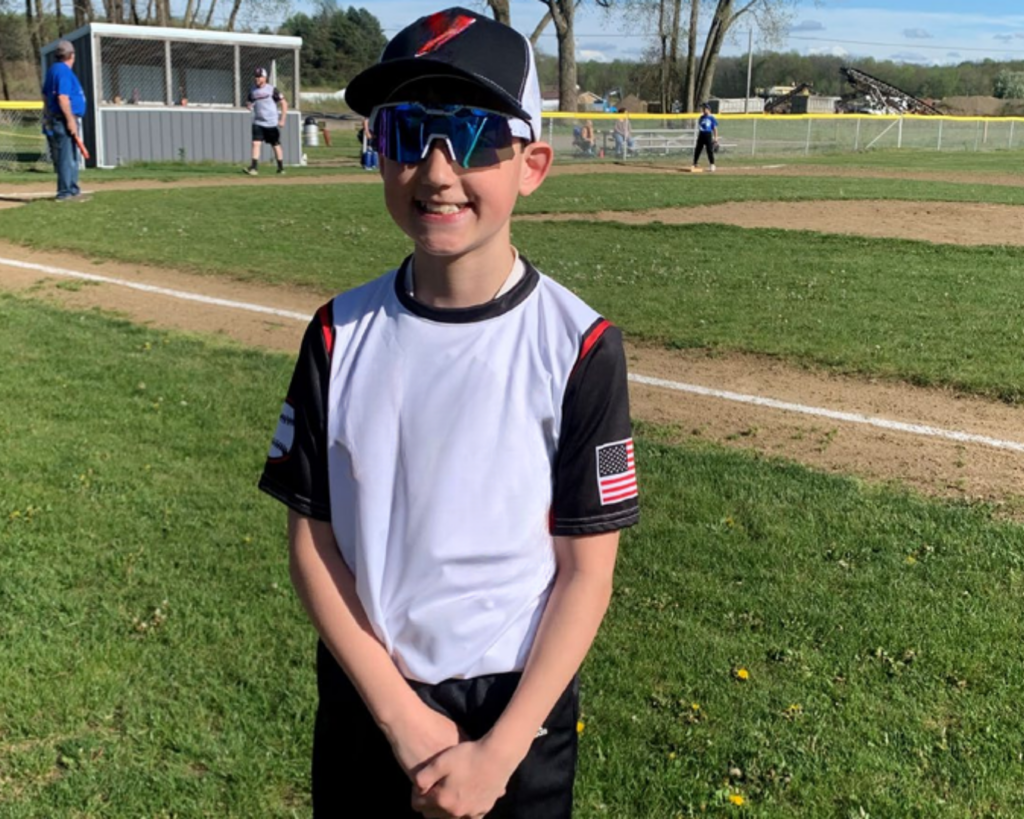Born with a congenital heart defect called tricuspid atresia Maxton, is now thriving thanks to the care he and his family received at UPMC Children’s. Read his story below.
Maxton runs across his family’s backyard, pausing just long enough to make sure his parents, Kristen and Angelo, are paying attention. With a quick jump, he catapults into a full forward flip. Landing perfectly on his feet, Maxton flashes his parents a big smile. Turning on his heels, he jets off, ready to take on the world.
A Broken Heart: Tricuspid Atresia
Kristen’s pregnancy with Maxton began normally. During her 18-week ultrasound appointment near the family’s home in Erie, PA, everything changed when the technician noticed a problem with the baby’s heart.
Kristen and Angelo’s unborn child was diagnosed with a serious congenital heart defect called tricuspid atresia. The condition affects blood flow and causes the right lower heart to be significantly underdeveloped.
“We were told he essentially has half a heart,” Kristen remembers. “Doctors said that if our little boy survives, he will never have a good quality of life.”
From Erie to Pittsburgh, and Back Again
When Maxton was born in November of 2014, Kristen was able to hold him for just a moment before he was rushed to UPMC Children’s Cardiac Intensive Care Unit (CICU) for specialty care. He was discharged home to Erie eight days later but then readmitted again in late November.
In December 2014, Maxton was at UPMC Children’s when he developed a life-threatening blood clot. He had a high fever and white blotches appeared on his arms. Terrified they would lose their baby in the hospital, Kristen and Angelo asked the hospital’s Pastoral Care team to perform Maxton’s baptism.
Maxton’s heart rate skyrocketed and even flatlined momentarily. The cardiology team swarmed the 2-month-old’s bedside, and thankfully, physicians and nurses brought him back to life. They treated the clot and stabilized Maxton.
Helping the Whole Family
Over the next two years, Maxton experienced 17 emergency room visits, several inpatient admissions, multiple heart catheterizations, and five general surgeries to care for his heart defect. With their family home nearly two hours away and Maxton’s two older sisters to care for, the period was quite challenging for Kristen and Angelo.
UPMC Children’s specialists used donor contributions to make a difficult situation a little easier for the family of five. Kristen shares that the Social Work team provided meal vouchers and gas cards to help offset the out-of-pocket costs incurred during the family’s many trips to and from Pittsburgh. The Child Life team cared for Maxton, as well as his two big sisters, offering sibling support, family activities, and distraction play during Maxton’s recurrent hospitalizations.
“The great thing about Children’s is everyone works together to help the whole family,” Kristen explains. “It’s about providing the best environment to help every child achieve the ideal outcome.”
A New Kid, Despite a Congenital Heart Defect
According to Kristen, the biggest turning point for Maxton was his second open-heart surgery in the summer of 2016. Following a cardiac catheterization, experts at UPMC Children’s Heart Institute performed a non-fenestrated Fontan procedure to redirect blood flow in Maxton’s heart to improve circulation. After a 28-day hospitalization, Maxton was discharged home.
Following discharge, Maxton looked physically healthier. His color was restored, and he had more energy than ever before. Kristen recalls, “He was like a new kid!”
Half a Heart, Not Half a Life
In the years since his Fontan procedure, Maxton and his family have made countless trips to UPMC Children’s. In addition to Cardiology, Maxton is seen by multiple divisions including Neurology, Pulmonology, ENT, General Surgery, Gastroenterology, Urology, and Hematology.

Yet, today, at age 9, Maxton is thriving. He continues to see experts from UPMC Children’s Heart Institute annually, but he and his family can now do so closer to home, at UPMC Hamot in Erie.
Currently in the third grade, Maxton keeps himself busy playing baseball, soccer, basketball, flag football, and just about every other physical activity available to him. He also enjoys spending time outdoors for activities like hunting and catching frogs.
As Maxton practices his backflips in the family’s backyard, his parents are reminded of their favorite expression. “We always say that Maxton may have been born with half a heart, but that doesn’t mean he’ll live half a life!”
Kristen goes on to explain that UPMC Children’s and the donors who invest in the hospital are the very reason Maxton is here today.
“Children’s is our home away from home,” she shares. “To the donors, I just want to express my gratitude. My son wouldn’t be living today without you. Thank you from the bottom of my heart.”

